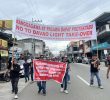DAVAO CITY, Philippines – The country’s inflation rate further slowed down to 0.9 percent in the month of September, according to the latest report of the Philippine Statistics Authority (PSA).
The latest figure, down from 1.7 percent inflation rate in August, also falls within the 0.6-1.4 percent estimate of the Bangko Sentral ng Pilipinas (BSP). The PSA added this is the slowest rate since June 2016, which was at 1.3 percent.
This is also lower compared to September last year’s inflation rate that reached to 6.7 percent, the highest in the last nine years.
BSP Governor Benjamin Diokno attributed the downward trajectory of inflation to “whole of government” effort, including the political will of President Rodrigo Duterte, and the Congress’s passage of Rice Tariffication Law (RTL).
BSP earlier projected the inflation to further drop as cheap imported rice flooded local market following the government’s move to liberalize the country’s rice industry.
However, consumer group Bantay Bigas pointed out that the lower inflation does not mean that prices of commodities have actually went down.
“The increase of prices only slowed down (in the previous months), but the goods remain to be sold in high prices,” Cathy Estavillo, Bantay Bigas spokesperson, said in an interview.
According to the group’s monitoring, the prices of goods in local markets continued to be expensive also due to the recent increases on fuel prices.
Bantay Bigas, along with other groups, had decried the impact of RTL to local rice farmers whose livelihood had been threatened by the said law.
“Farmers lost much income due to the drop of palay (unhusked rice) prices this harvest season,” Estavillo said, citing the farm gate prices as low as P7 per kilo in some areas in the country.
“What the government’s economic managers is claiming that (the inflation slowed down) because of the rice liberalization law is not true. The prices of common goods remain to be high, and what’s worse, is the widespread displacement and hunger of our Filipino farmers,” Estavillo said.
Bantay Bigas, together with Anakpawis Party-list and Amihan peasant women group, had also started a signature campaign for the scrapping of RTL.
“Rice liberalization meant hardships to struggling rice farmers. More than two million farmers are enduring high cost of inputs and fuel for production. On top of the impact of the TRAIN law in 2018, farm gate prices fell dramatically this year when the law was enacted. Moreover, the unprecedented influx of imported rice failed to pull down prices of rice, while hammering farm gate prices,” former Anakpawis Representative Ariel “Ka Ayik” Casilao said in a statement.
Casilao said that amidst the continuing price hikes of basic goods and services, the 0.9 percent inflation recorded in September “does not reflect the real situation of poor and ordinary consumers burdened by price shocks due to the effect of TRAIN Law and unabated hike on fuel prices.” (davaotoday.com)








